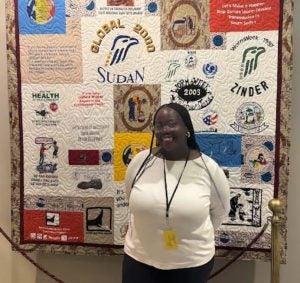
A MAAS alum reflects on her work at the Carter Center’s Conflict Resolution Program
By Nisrine Hilizah
Last year I had the privilege of working with the Carter Center, a non-governmental organization based in Atlanta, Georgia that is dedicated to ad- vancing human rights, democracy, and con- flict resolution around the world. Founded in 1982 by former U.S. President Jimmy Carter and former First Lady Rosalynn Carter, the Center has become a key player in international peacebuilding.
One reason I was drawn to work at the Carter Center was because of their longstanding commitment to supporting democratic governance, peacebuilding, and stability in Sudan. The Center has been active in the country since 1986 through initiatives ranging from election observation to public health—a legacy of engagement that has taken on new urgency since war broke out in 2023. In response to the ensuing crisis, the Carter Center now works closely with local organizations that monitor the conflict and advocate for democratic accountability, helping ensure that Sudanese voices remain central to shaping the country’s future.
Among the Carter Center’s key partners is the Youth Citizens Observer Network (YCON), a youth-led organization dedi- cated to monitoring and reporting on the ongoing conflict. During my internship, I supported YCON as part of the Conflict Resolution Program’s Sudan Team, provid- ing technical and administrative assistance while monitoring and analyzing political, economic, and security developments in Sudan. I compiled daily news reports from English- and Arabic-language sources to keep the team updated on the war’s rapidly shifting dynamics and humanitarian con- sequences. I also reviewed and synthesized YCON’s field reports—covering issues such as civilian displacement, governance challenges, and evolving military dynamics—into briefing materials that informed the team’s strategic responses. This experience reinforced my belief in the importance of locally led initiatives and the vital role organizations YCON play in keeping international actors informed and accountable to Sudanese realities.
The highlight of my internship was traveling to Nairobi, Kenya, for the 2024 Lead Observers Training, where I met with YCON representatives and learned about their work. These discussions gave me a deeper appreciation for the difficulties grassroots organizations face, from security concerns to resource constraints. Despite these obstacles, YCON’s members remained steadfast in their commitment to documenting the war, which was incredibly inspiring.
My experience at the Carter Center built directly on my academic and professional background. As a recent graduate of the MAAS program, I had spent years studying governance, conflict, and political transitions in the Arab world—particularly in Sudan. The intersections of civil society, state authority, and international intervention, which I explored during my graduate stud- ies, became central to my daily work at the Center. My training in Modern Standard Arabic and familiarity with Sudanese Arabic allowed me to access diverse sources, translate and analyze Sudanese media, and facilitate communication with my Sudanese counterparts. This experience sharpened my ability to interpret complex political dynamics in real time and reinforced my commitment to work that connects research, policy, and program implementation in international development and conflict resolution.
One of the most significant takeaways from my time at the Carter Center was the importance of centering local voices in peacebuilding efforts. Sudanese civil society groups like YCON are not merely observers of the conflict—they are active participants in shaping the country’s future. Strengthening their capacity and ensuring their perspectives are heard is essential for any meaningful resolution to the war. I also learned how essential adaptability is in crisis-response work. The situation in Sudan changed rapidly, requiring us to shift focus frequently and reassess our approach. Learning how to navigate this level of uncertainty while maintaining analytical rigor was an invaluable professional lesson.
Ultimately, this experience reaffirmed my commitment to working at the intersection of conflict resolution, policy, and development, and it provided me with a deeper understanding of the challenges and opportunities of supporting peacebuilding efforts in fragile states. As someone with South Sudanese heritage, this work held deep personal meaning. It strengthened my resolve to contribute to locally driven solutions in conflict-affected areas. I look forward to carrying these insights into future roles that advance peace, justice, and sustainable development. ◆
Nisrine Hilizah, who graduated from MAAS in 2023, is a former International Program Specialist at the U.S. Department of Commerce.
This article was published in the Fall 2024-Spring 2025 issue of the CCAS Newsmagazine.